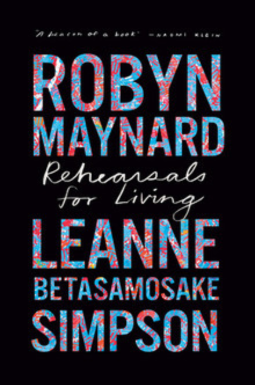Decolonizing Reading Club: Rehearsals for Living
In January 2021, LWF and the Lake Winnipeg Indigenous Collective (LWIC) collaboratively created a reading club to grow our teams’ understanding of Indigenous perspectives and experiences, truth and reconciliation, treaty obligations, and the history and legacy of colonization. Through group discussions on shared readings, this reading club genuinely created a brave space for personal and professional learning and reflection that hadn’t been possible in other workshops and trainings.
Rehearsals for Living
by Robyn Maynard and Leanne Betasamosake Simpson

Our book club recently delved into Rehearsals for Living, co-authored by Robyn Maynard, a distinguished abolitionist, scholar, writer and Black feminist, and Leanne Betasamosake Simpson, a fellow organizer, Mississauga Nishnaabeg writer, musician and academic.
The book is formatted as a tender exchange of alternating letters between Maynard and Simpson, as they navigate their emotions and expectations during 2020’s unfolding global pandemic. Though their correspondence, they reflect on the social upheavals and deepened inequities caused by COVID-19, bear witness to the rise of monumental solidarity movements – from #ShutDownCanada leading national demonstrations in solidarity with Wet’suwet’en land defenders to Black Lives Matter protests against racism and police brutality – and provide thoughtful analysis on current and historical collective efforts to build a better world for our communities and future generations.
Through their letters, Maynard and Simpson explore a world not built for them and their respective communities, but rather, constructed atop them. Carceral state violence, land theft, resource extraction and climate catastrophes are presented as symptoms of the triad of oppression: settler colonialism, capitalism and white supremacy. Following along, the reader can begin to connect seemingly distinct struggles to these oppressive forces that work to reinforce each other at every step.
The authors address the false dichotomy which aims to separate anti-colonial and Black liberation struggles. This artificial division, rooted in white supremacy, aims to compartmentalize our focus, fostering an either-or mindset that undermines the interconnectedness of our struggles. The authors challenge us to transcend our bursts of outrage and recognize the shared origins of our resistance against oppression so that we can work towards building a future together: a future that seeks collective care and transformative justice over a reliance on policing; a future that is rooted in our relationships and responsibilities to the land and each other; miyeu pimaatshiwin – the way to a good life.
As I reflect on what both Maynard and Simpson offered in this book, I find myself contemplating the nature of grassroots organizing and solidarity movements. From the Black intersectional feminists and Indigenous liberation collectives that paved the way before us all, I understand through their work that our struggles are intrinsically connected and require intersectionality to be truly effective in rebuilding a better world for us all. Maynard and Simpson remind us to reject the notion of finite solidarity and push for abundance in our movements. The book serves as a reminder that true freedom is collective – only achieved when the boot of colonialism and all its systemic extensions are lifted from the necks of all oppressed peoples. We aren’t free until we are all free.
By: Kianna Durston, Lake Winnipeg Indigenous Collective Program Lead
Want to read more?
Staff reflections on other readings can be found on our Decolonizing Reading Club web page.